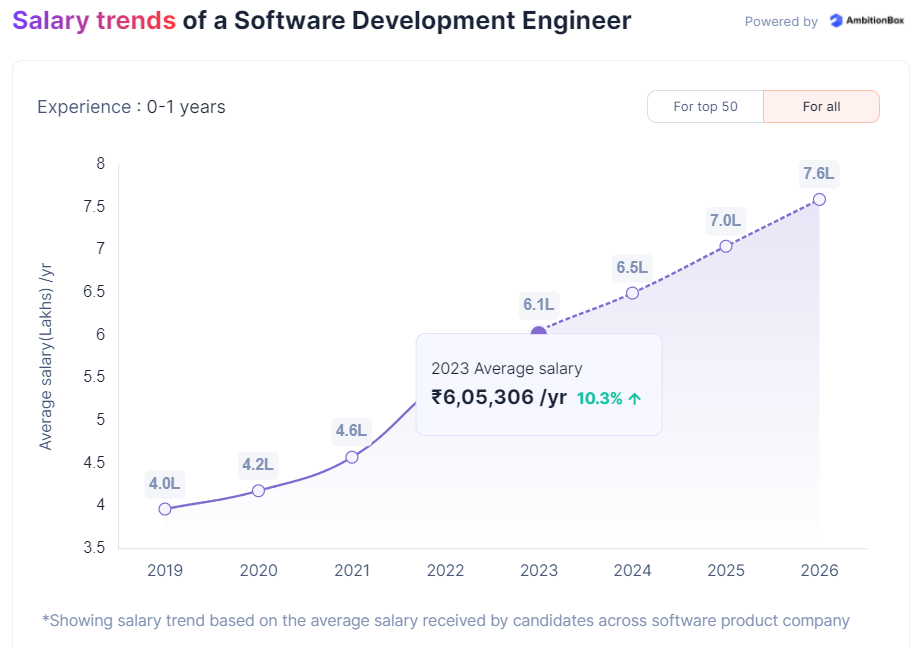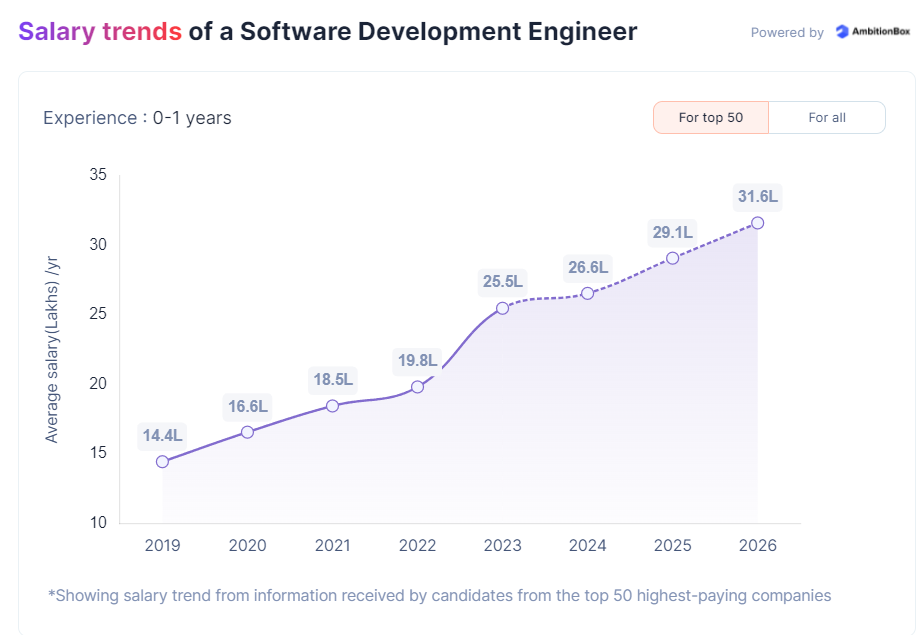Engineering has always been a field of innovation and evolution, offering exciting opportunities for those who choose it as a career path. As a fresh graduate or a college student,…

Software Development Engineer [SDE] – Full Form, How to Become
Software Development Engineers (SDEs) are the backbone of the technology industry, responsible for crafting innovative software solutions that power our digital world. In this extensive guide, we will delve into the world of SDEs, exploring their roles, career paths, key skills, and salary prospects
Whether you’re a college student or a fresh graduate looking to pursue a career in software development, this article will provide you with all the information you need to embark on this exciting journey.
Who is a Software Development Engineer [SDE]?
Software Development Engineers, or Software Developers, are professionals who design, develop, and maintain software applications, systems, and solutions. They work on a diverse range of projects, from creating mobile apps and web applications to building complex operating systems and infrastructure software. SDEs are crucial in transforming concepts into functional software that drives technological advancements.
As an SDE, you will collaborate with cross-functional teams, such as product managers, designers, and quality assurance engineers, to ensure that the software you develop meets user requirements and business objectives. This role is highly dynamic, requiring problem-solving skills, creativity, and a deep understanding of programming languages and software development methodologies.
SDE Full Form
SDE stands for Software Development Engineer.
It is a job role commonly used in the tech industry, especially by top companies like Amazon, Microsoft, Google, etc., referring to professionals who design, develop, test, and maintain software systems and applications.
Difference Between SDE 1, SDE 2, and SDE 3 in a Software Product Company
In a software product company, SDEs typically follow a career progression that involves different levels, such as SDE 1, SDE 2, and SDE 3. These levels indicate a hierarchy of experience and expertise, and they come with varying responsibilities and expectations:
- SDE 1: Entry-level SDEs, often recent college graduates or professionals with a year of experience. They work on well-defined tasks and receive mentorship to improve their skills.
- SDE 2: Mid-level SDEs with more experience and independence. They work on more complex projects, design software components, and may lead small teams.
- SDE 3: Senior SDEs who are considered experts in their field. They work on critical projects, mentor junior engineers, and have a strong influence on technical decisions and strategy.
The progression from SDE 1 to SDE 3 is usually performance-based and involves demonstrating consistent growth in technical skills, problem-solving abilities, and leadership.
How to Become a SDE – Software Development Engineer?
Becoming a Software Development Engineer is an exciting journey that requires a combination of education, skills, and practical experience. Here are the steps to help you become a software development engineer:
- Educational Background: Obtain a bachelor’s degree in computer science, software engineering, or a related field. This educational foundation provides you with the fundamental knowledge required for a career in software development.
- Learn Programming Languages: Develop proficiency in programming languages, such as Python, Java, C++, or JavaScript. These languages are fundamental tools for software development.
- Gain Practical Experience: Engage in coding projects, contribute to open-source software, or complete internships to gain hands-on experience. Building a portfolio of your work is essential.
- Build Problem-Solving Skills: Problem-solving is at the core of software development. Practice solving coding challenges and puzzles on platforms like Coding Ninja and more.
With the help of our Pathfinder, you can also check your career readiness and assess your level of preparation for the job. Check your readiness here-
- Create a Resume: Make a compelling resume to give prospective employers comprehensive information about your professional background and skill set in the development industry. To make your resume Applicant Tracking System (ATS) compatible, customize it according to the job requirements and use keywords from the job description.
- Stay Updated: The technology industry evolves rapidly. Stay updated with the latest trends, tools, and best practices in software development.
- Network and Collaborate: Engage with the developer community, attend conferences, and collaborate with peers on projects to broaden your knowledge and skills.
- Apply for Jobs: Start applying for entry-level SDE positions or internships. Tailor your resume to highlight your education, skills, and relevant experience.
- Prepare for Interviews: Be ready for technical interviews that assess your coding, problem-solving, and algorithmic skills. Practice mock interviews and study data structures and algorithms.
- Showcase Soft Skills: Communication, teamwork, and adaptability are crucial soft skills in software development. Demonstrate these qualities during interviews.
Difference Between Software Developer vs. Software Engineer?
The terms ‘software developer’ and ‘software engineer’ are often used interchangeably, but they can have distinct connotations depending on the context. Here’s a breakdown of the key differences:
Software Developer
- Focuses on writing code and developing software applications.
- Primarily concerned with implementation and coding tasks.
- May work on smaller projects, with a narrower scope of responsibilities.
Software Engineer
- Involves a more holistic approach to software development, including design, architecture, and project management.
- Considers the entire software development life cycle.
- Tends to work on larger, more complex projects and often holds a deeper understanding of software engineering principles.
It’s important to note that these distinctions can vary by company and industry, and the roles may overlap. In practice, the title you hold might not strictly define your responsibilities.
Key Skills for a Software Developer
To excel as a Software Development Engineer, you need a combination of technical skills and soft skills. Here are some key skills that every Software Development Engineer should possess:
- Programming Languages: Proficiency in one or more programming languages, such as Python, Java, C++, or JavaScript.
- Data Structures and Algorithms: A strong understanding of data structures and algorithms is essential for efficient problem-solving.
- Version Control: Familiarity with version control systems like Git to collaborate and manage code effectively.
- Debugging and Troubleshooting: The ability to identify and fix issues in code is crucial for software development.
Soft Skills for Software Development Engineers
Software Development Engineers (SDEs) need a variety of soft skills to succeed in their careers. These skills are essential for working effectively with others, managing projects, and delivering high-quality products.
- Problem-Solving: Software developers often face complex problems that require creative and systematic solutions.
- Teamwork: Collaboration with designers, product managers, and other team members is a regular part of the job.
- Communication: Effective communication skills, both written and verbal, is important for sharing ideas and collaborating with colleagues.
- Adaptability: The tech industry evolves rapidly, so being adaptable and open to learning new technologies is vital.
- Security Awareness: Understanding security best practices to protect software from vulnerabilities.
- Emotional intelligence: SDEs need to be able to understand and manage their own emotions, as well as the emotions of others. This is important for building relationships, resolving conflict, and creating a positive work environment.
Hard Skills for Software Development Engineers
Software Development Engineers (SDEs) need a variety of hard skills to succeed in their careers. These skills are essential for designing, developing, testing, and deploying software applications.
- Software design principles: SDEs need to be familiar with software design principles such as object-oriented programming, modularity, and design patterns.
- Database management: SDEs need to have a good understanding of database management systems (DBMS) such as MySQL, PostgreSQL, and Oracle.
- Testing procedures: SDEs need to be able to test software applications to identify and fix defects.
- Version control systems: SDEs need to be familiar with version control systems such as Git and Mercurial.
- Operating systems: SDEs need to be familiar with operating systems such as Linux, Windows, and macOS.
- DevOps tools and technologies: SDEs need to be familiar with DevOps tools and technologies such as Docker, Kubernetes, and Ansible.
What Does a Software Development Engineer do?
The day-to-day responsibilities of a Software Development Engineer can vary based on their role, company, and project. However, here are some common tasks and duties that SDEs perform:
- Requirements Analysis: Understand and gather requirements from stakeholders to define the software’s functionality.
- Design: Plan the software’s architecture, data structures, and user interfaces.
- Coding: Write and test code to implement the software’s features and functionalities.
- Testing: Perform unit testing and integrate testing to identify and fix bugs and issues.
- Maintenance and Updates: Regularly update and maintain the software to ensure it remains functional and secure.
- Collaboration: Work closely with cross-functional teams, including designers, quality assurance engineers, and project managers.
- Documentation: Create documentation for code, software architecture, and user guides.
- Problem-Solving: Tackle complex problems and find innovative solutions.
- Continuous Learning: Stay updated with the latest industry trends and technologies.
- Optimization: Optimize code and software for performance and efficiency.
- Deployment: Assist in deploying the software to production environments.
- Security: Implement security measures to protect the software from potential threats.
It’s important to note that SDEs can specialize in various domains, such as web development, mobile app development, game development, or system software development, which can influence their daily tasks.
Why Choose a Career in Software Development?
Pursuing a career in software development after graduation offers numerous advantages, making it an attractive choice for many. Here are some compelling reasons to consider:

- High Demand: The tech industry is booming, and software developers are in high demand. This demand is unlikely to decrease, offering job security.
- Competitive Salaries: Software developers typically enjoy competitive salaries, even at the entry-level.
- Innovation: Working in software development allows you to be at the forefront of technological innovation, creating products and solutions that shape the future.
- Remote Work: Many software development roles offer flexibility, including the option to work remotely, making it an appealing choice for work-life balance.
- Continuous Learning: The tech industry is constantly evolving, providing opportunities for continuous learning and growth.
- Global Opportunities: Software developers often have the chance to work with global teams and clients, broadening their horizons.
- Creativity: Software development allows you to express your creativity through coding and problem-solving.
- Job Satisfaction: Many software developers find the work intellectually stimulating and derive job satisfaction from seeing their creations come to life.
- Entrepreneurship: Software development skills can open doors to entrepreneurship and the creation of your own software products.
All these factors make software development an exciting and rewarding career choice for recent graduates.
Software Developer Salary – Education, Location, and Company-Wise Analysis
Salary in the software development field can vary significantly based on factors like education, location, and the company you work for. Here’s an analysis of how these variables affect SDE salaries:
Average Salary for Software Development Engineers by Education
While a bachelor’s degree is a common educational path for software developers, it’s not the only route. Many self-taught developers or boot camp graduates also find success in the field. However, a bachelor’s degree can open doors to higher-paying roles and career advancement.

Average Salary for Software Development Engineers by Location
Salaries for software developers vary by region. Tech hubs like Bangalore, Hyderabad, NOIDA, Gurugram, etc. often offer higher salaries to compensate for the higher cost of living. However, remote work opportunities have made it possible to earn competitive salaries in regions with a lower cost of living.
- Pune: ₹6,70,817 per year
- New Delhi: ₹5,30,762 per year
- Noida: ₹6,81,319 per year
- Gurgaon: ₹7,22,681 per year
- Hyderabad: ₹7,66,752 per year
- Mumbai: ₹8,18,686 per year
- Bengaluru: ₹8,75,047 per year
- Chennai: ₹7,94,588 per year
Average Salary for Software Development Engineers by Company
The size and reputation of the company you work for can impact your salary. Large tech giants like Google, Amazon, and Microsoft tend to offer higher salaries and generous benefits. Startups and smaller companies may offer competitive salaries with equity options.

To provide a more detailed perspective, here’s a rough estimate of software developer salaries in India:
- Entry-Level SDE 1: ₹6-12 lakhs per annum
- Mid-Level SDE 2: ₹12-25 lakhs per annum
- Senior-Level SDE 3: ₹25 lakhs and above per annum
Keep in mind that these figures can vary widely, and some companies may offer even higher salaries, especially in metropolitan areas.
Programming Languages and Certifications for Software Development Engineer
The choice of programming languages and certifications can significantly impact your career as a software development engineer. Here’s a look at some popular programming languages and certifications that can enhance your skill set and marketability:
Programming Languages for Software Development Engineers
- Python: Python is known for its simplicity and versatility. It’s widely used in web development, data analysis, artificial intelligence, and scientific computing.
- Java: Java is a powerful and platform-independent language. It’s used in a wide range of applications, including Android app development, enterprise software, and web applications.
- JavaScript: JavaScript is essential for web development, enabling dynamic and interactive web pages. It’s a key language for front-end and back-end development.
- C++: C++ is commonly used in game development, system software, and high-performance applications. It’s known for its efficiency and speed.
- C#: C# is a popular language for Windows application development, game development with Unity, and enterprise software.
- Ruby: Ruby is known for its simplicity and is commonly used in web development, particularly with the Ruby on Rails framework.
- Swift: Swift is the go-to language for iOS app development, known for its speed and safety.
Certifications Needed for Software Development Engineers
- AWS Certified Developer: This certification validates your expertise in developing and maintaining applications on the Amazon Web Services (AWS) platform, a valuable skill for cloud-based software development.
- Certified ScrumMaster (CSM): CSM certification demonstrates your understanding of Scrum methodologies and agile project management, which are widely used in software development.
- CompTIA Security+: Asecurity certification, CompTIA Security+ is valuable forsoftware developers working on projects with a security focus.
- Certified Information Systems Security Professional (CISSP): CISSP certification is essential for software developers specializing in cybersecurity.
- Google Associate Android Developer: This certification is for Android app developers and validates their skills in creating high-quality Android applications.
- Microsoft Certified – Azure Developer Associate: Ideal for software developers working with Microsoft Azure, this certification demonstrates your proficiency in building, testing, and maintaining Azure solutions.
The choice of programming language and certification should align with your career goals and the specific areas of software development you are interested in.
Becoming a Software Development Engineer is a rewarding and dynamic journey that offers endless opportunities for growth and innovation. In this comprehensive guide, we’ve explored the world of SDEs, their career progression, the skills required, and the factors that influence their salaries.
FAQs on Software Development Engineer [SDE]
What is a Software Development Engineer?
A Software Development Engineer [SDE] is a professional who designs, develops, and tests software applications. They are responsible for writing code, debugging software, and ensuring that the software meets the requirements of the client.
What are the skills required to become an SDE?
The skills required to become an SDE include programming languages such as Java, Python, C++, and Ruby, knowledge of software development methodologies, familiarity with databases, and experience with software testing.
What is the average salary of an entry-level SDE?
According to Ambitionbox, the average base salary for an entry-level SDE in India is ₹25,48,230/- per year, for the top 50 software product companies.
What are the different types of SDE roles?
The different types of SDE roles include Software Development Engineer, Software Development Engineer in Test, and Senior Software Development Engineer.
What is the career path for an SDE?
The career path for a Software Development Engineer typically starts with an entry-level position and progresses to a senior-level position. Some SDEs may also choose to specialize in a particular area such as software testing or database management.
What are the job responsibilities of an SDE?
The job responsibilities of a Software Development Engineer include designing and developing software applications, writing code, debugging software, and ensuring that the software meets the requirements of the client.
What are the educational qualifications required to become an SDE?
The educational qualifications required to become an SDE include a bachelor’s degree in computer science or a related field. Some employers may also require a master’s degree in computer science.
What is the role of software testing in software development?
The role of software testing in software development is to ensure that the software meets the requirements of the client and is free of bugs and errors.
What are the different software development methodologies?
The different software development methodologies include Agile, Waterfall, and Scrum.
Latest Posts
Top Skills in Resume For Freshers – 2026 Detailed Guide
Creating a compelling resume as a fresh graduate can be a daunting task, but it’s also your ticket to landing your dream job. One of the key elements that can…
Step-by-Step Guide: How to Become a Mechanical Engineer
Mechanical engineering stands as one of the most versatile and in-demand engineering disciplines globally, offering exciting career opportunities across diverse industries. For college students and recent graduates in India, understanding…
What is Upskilling? – Meaning, Benefits and Tips to Upskill
Being ahead of the curve is more crucial than ever in the ever-changing world of today. This requires ongoing skill development and technological adaptation. This entails upskilling or reskilling for…
Top 10 Do’s and Don’ts For Your First Job
Looking for a new job can be a daunting task, especially if you’re a fresher. There are so many factors to consider, from the type of job you want to…
Popular Posts
100+ Quantitative Aptitude Questions for Placement with Answers
Quantitative aptitude questions play a crucial role in campus placements, competitive exams, and entry-level job interviews. Whether you are preparing for your first job interview, an aptitude test for placement,…
How to Start an AI Career in India: Skills and Future of Work
Artificial Intelligence (AI) is revolutionizing industries worldwide. From automating routine tasks to enabling self-driving cars and intelligent healthcare diagnostics, AI is reshaping the future of work. For college students and…
How to Write Mail for Job Application – Explained
A job application email is a professional email that you send to a potential employer to express your interest in a job opening. It is typically accompanied by your resume…
Google Internship 2026 for Freshers: All You Need to Know
In the competitive landscape of technology careers, a Google internship stands out as a golden opportunity for aspiring professionals. Whether a college student or a recent graduate, securing an internship…
How to Write a Job Application Letter (With Samples)
When it comes to applying for your first job, making a great first impression is crucial. As a recent graduate, you might feel a little intimidated by the idea of…

